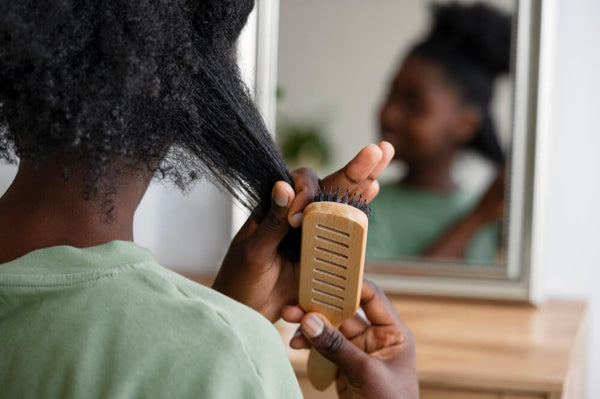Alopecia areata is an autoimmune condition that leads to hair loss. If you or someone you know is experiencing this condition, you may be wondering how to stop it from getting worse. The exact cause of this autoimmune disorder is not fully understood, making it challenging to predict or prevent its onset. Although there is no conclusive remedy for alopecia areata, you can implement practical measures to handle the condition and potentially impede its advancement. In this article, we will explore some strategies and lifestyle changes that may help prevent alopecia areata from worsening.
Signs of Alopecia Areata
Patchy Hair Loss:
The most conspicuous indication of alopecia areata is the abrupt emergence of small, circular, or oval patches of hair loss on the scalp. These patches may be smooth and have a distinct border.
Rapid Onset:
Alopecia areata can lead to swift hair loss, frequently occurring within a few days or weeks. The sudden commencement of hair loss is a prominent characteristic of this condition.
Regrowth in White or Gray:
In some cases, hair may begin to regrow in the affected areas. However, the regrown hair is often fine, colorless, or white, which can create a noticeable contrast with the surrounding normal hair.
Loss of Eyebrows and Eyelashes:
Alopecia areata can also affect other hair-bearing areas, such as eyebrows and eyelashes. The loss of hair in these areas may occur simultaneously with scalp involvement or independently.
Complete Baldness (Alopecia Totalis) or Body Hair Loss (Alopecia Universalis):
In some cases, the condition can progress to involve the entire scalp (alopecia totalis) or even the entire body, including all body hair (alopecia universalis).
Cyclical Nature:
Alopecia areata may display a cyclical pattern, involving phases of hair loss succeeded by spontaneous regrowth. The recurrence of hair loss and regrowth can be unpredictable.
It's important to note that alopecia areata is an autoimmune disorder, and its exact cause is not fully understood. While the condition is generally not associated with pain or other physical symptoms, the emotional impact of hair loss can be significant. Early intervention can sometimes help manage the condition more effectively.
Best Ways to Control Alopecia Areata
Trichologist:
Initiating the management of alopecia areata involves seeking guidance from a dermatologist. A qualified healthcare professional can deliver a precise diagnosis, assess the scope of the condition, and present tailored treatment options. Trichologists may recommend topical steroids, corticosteroid injections, or other immunotherapy treatments to suppress the immune system's attack on hair follicles.
Exercise regularly:
Participating in physical activity enhances circulation, alleviates stress, and contributes to overall well-being. Strive for a minimum of 30 minutes of moderate exercise on most days of the week.
Prioritize sleep:
Prioritizing sufficient and quality sleep is essential for overall health and a robust immune system. Aim for 7-9 hours of sleep each night and establish a consistent sleep routine.
Address Underlying Stress:
Stress is a commonly identified trigger for alopecia areata flare-ups. To enhance overall well-being and potentially prevent the worsening of the condition, incorporate stress-reducing techniques such as meditation, deep breathing exercises, and yoga into your routine. Adequate sleep and regular exercise are fundamental aspects of effective stress management. Engaging in activities like meditation, deep breathing exercises, yoga, or spending time in nature can effectively reduce stress levels.
Balanced Diet:
A nutrient-rich diet plays a crucial role in maintaining overall health, including the health of hair follicles. Ensure your diet includes a variety of vitamins and minerals, such as iron, zinc, vitamin D, and omega-3 fatty acids. These nutrients support hair growth and can help prevent further hair loss.
Avoid smoking and excessive alcohol consumption:
These habits can weaken the immune system and exacerbate autoimmune conditions, including alopecia areata. Quitting smoking and moderating alcohol intake can help maintain overall health.
Avoid Harsh Hair Treatments:
To avoid placing additional stress on hair follicles that are already weakened, it's recommended to steer clear of harsh chemical treatments, excessive heat styling, and tight hairstyles. Be gentle in your hair care routine by opting for mild shampoos and conditioners, and whenever possible, let your hair air-dry.
Protect Your Scalp:
For those dealing with alopecia areata, safeguarding the scalp from severe weather conditions, including extreme cold or prolonged sun exposure, can be advantageous. Wearing a hat or using sunscreen on the scalp can prevent further damage and minimize the risk of exacerbating the condition.
Support Groups:
Seeking support from loved ones or professional therapists can offer valuable emotional assistance during challenging times. Coping with alopecia areata can be emotionally demanding. Finding support through group sessions or seeking therapy offers a valuable platform to share experiences, gain coping strategies, and alleviate the emotional impact of hair loss.
Regular Follow-ups:
Regular follow-up appointments with your dermatologist are crucial for monitoring the condition's progression and adjusting treatment plans as needed. Consistent communication with your healthcare provider ensures that any changes in your symptoms are addressed promptly.
Conclusion
While alopecia areata can be a distressing condition, taking proactive steps to manage the disorder can help prevent further hair loss and promote regrowth. Combining medical interventions with lifestyle changes, stress management, and a healthy diet can contribute to an overall strategy for stopping alopecia areata from getting worse.















